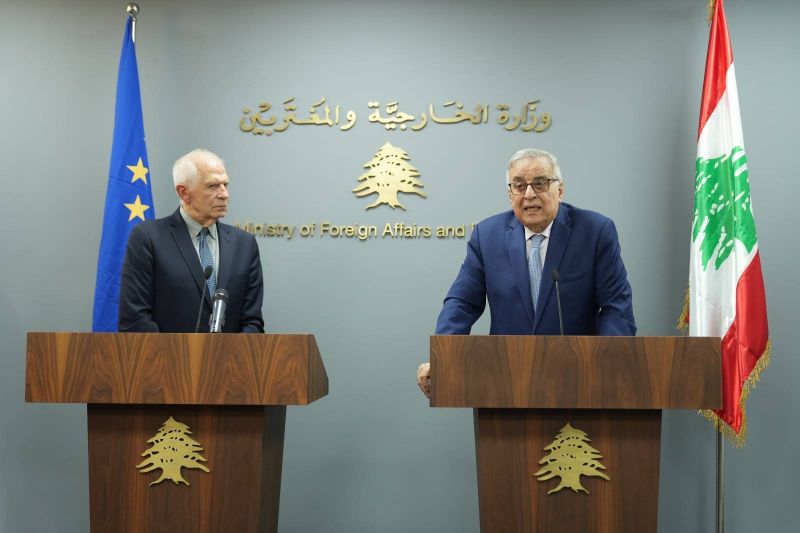
The European Union's head of diplomacy, Josep Borrell, during the joint press conference with his Lebanese counterpart, Abdallah Bou Habib, on Jan. 6, 2024 in Beirut. (Credit: Mohammad Yassine)
On a tour of Lebanon, the European Union's head of diplomacy, Josep Borrell, argued on Saturday that the country should not be "drawn into a regional conflict," against the backdrop of clashes in the south of the country between Hezbollah and the Israeli army.
Borrell's visit is part of a diplomatic effort to avoid a spillover of the Israel-Hamas war, but also to call for a solution to the war.
"It is imperative to avoid a regional escalation in the Middle East. It is absolutely necessary to avoid Lebanon being dragged into a regional conflict," Borrell said at a joint press conference in Beirut with his Lebanese counterpart, Abdallah Bou Habib, with whom he had spoken earlier. "I also send this message to Israel: No one will come out a winner from a regional conflict," he added.
"I believe that war can be avoided, that it must be avoided, and that diplomacy can win the day," said Borrell. "Diplomatic channels must be open to signal that war is not the only option, but that it is the worst," he insisted. "Israel has proclaimed its objective of eradicating Hamas. There must be another way of eradicating Hamas that would not cause so many deaths."
Bou Habib assured that "only a political solution will put an end to decades of violence," according to remarks reported by local channel MTV. "The Lebanese are committed to peace," he added. "We discussed ways of implementing Resolution 1701," he said, quoted by Reuters.
South Lebanon has been the scene of almost daily fire exchanges between Hezbollah and the Israeli army since Oct. 8, displacing 76,018 people, according to a report published Thursday by the International Organization for Migration (IOM). The cross-border violence has left 175 people dead in Lebanon, including 129 Hezbollah fighters and more than 20 civilians, including three journalists, according to an AFP count, and 149 Hezbollah fighters, according to our count.
Resolution 1701, adopted to end the war between Israel and Hezbollah in 2006, provides for the deployment of the United Nations Interim Force in Lebanon (UNIFIL) and the Lebanese army, and the withdrawal of Hezbollah from the border region.
Risks of escalation
Earlier in the day, Borrell was briefed "on the current risks of escalation along the Blue Line" in southern Lebanon, during a meeting with the Commander-in-Chief of UNIFIL, General Arnoldo Lazaro. "I reaffirmed the EU's strong support for the UN mission, which plays a crucial role in preventing and mitigating the risks of escalation," Borrell wrote on X (formerly Twitter).
On Saturday morning, Hezbollah fired 62 rockets against the Israeli base at Meron, in what it described as its "first response" to the attack blamed on Israel, which on Tuesday killed Hamas number two Saleh al-Arouri in the southern suburbs of Beirut.
On Friday, Hezbollah Secretary General Hassan Nasrallah opened the door to possible negotiations after the Israel-Hamas war, in a televised speech. He spoke of a "historic opportunity" for Lebanon to liberate all its territory, "once the page of war has been turned." His message was addressed to the US, and in particular to its presidential envoy Amos Hochstein, who is currently in Tel Aviv to continue negotiations for a political settlement of the conflict with Lebanon.
Implementing 1701
The Israel-Hamas war and the fire on southern Lebanon was also on the agenda of discussions between the head of European diplomacy and the outgoing Lebanese Prime Minister, Najib Mikati.
"We aspire to stability and are establishing the necessary contacts in this regard, because any large-scale explosion in south Lebanon will lead the region to a global explosion," Mikati asserted, according to a statement from his press office.
Mikati also emphasized "Lebanon's commitment to implementing UN Resolution 1701," stressing that "the full implementation of this resolution requires first of all an end to Israeli violations of Lebanese sovereignty, as well as [Israeli] withdrawal from the occupied Lebanese territories."
The EU's head of diplomacy also held talks with the Speaker of the Lebanese Parliament, Nabih Berri. He expressed his "great concern at the continuation of the war in the Gaza Strip and his fear of seeing this conflict spread to Lebanon," according to the official National News Agency (NNA).
Borrell expressed "his fear of an Israeli escalation, stressing that priority must be given to ending the war in Gaza, which is a gateway to a return to calm in Lebanon." He also called for the full implementation of Resolution 1701.
Nabih Berri pointed out that implementation of resolution 1701 "begins with an end to Israeli aggression and the withdrawal of the Hebrew state from all occupied Lebanese territory."
This article was originally published in L'Orient-Le Jour.